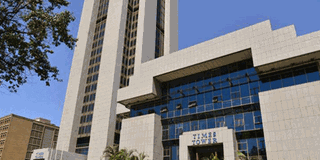Win for KRA as most traders comply with tax register rule

Times Tower, Kenya Revenue Authority headquarters in Nairobi. A majority of Value Added Tax (VAT) businesses have complied with a directive by KRA to fit mandatory internet-enabled tax registers (ETRs) by yesterday, boosting plans by the government to maximise revenue collection.
A majority of Value Added Tax (VAT) businesses have complied with a directive by the Kenya Revenue Authority (KRA) to fit mandatory internet-enabled tax registers (ETRs) by yesterday, boosting plans by the government to maximise revenue collection.
Sources told Daily Nation that about 68 per cent of VAT-registered large and medium traders had complied as of October 12, 2022, ahead of the deadline—meaning that the transactions of most VAT-paying traders are now directly monitored by the tax man to curb revenue leaks.
Manufacturers and traders are expected to install the upgraded ETRs that will enable the KRA to receive real-time data on traders’ daily sales, an upgrade from the current manual tax registers that store sales data for scrutiny by the KRA after 30 days. Besides the upgraded ETR devices, traders are supposed to procure software.
The new automated registers will help KRA receive sales and invoice data daily in the latest push to curb tax evasion and boost revenue collections.
Manufacturers and traders who fail to upgrade to ETRs at their business premises risk a fine of Sh1 million or a jail term of three years.
Businesses with an annual turnover of at least Sh5 million are under the law required to have ETRs as the KRA seeks to seal revenue leakages from the big taxpayers. But even as KRA pushed for compliance, some traders are still reporting teething software problems with the ETRs machines.
The regulations are designed to heighten KRA’s visibility of transactions for purposes of sealing revenue leakages that result in underperformance in tax revenue collection.
According to data from the National Treasury, Kenya foregoes an average of Sh383.9 billion worth of would-be tax revenue every year, with VAT accounting for the lion’s share of this revenue leakage at Sh 314.7 billion or just about 82 per cent of the total amount.




